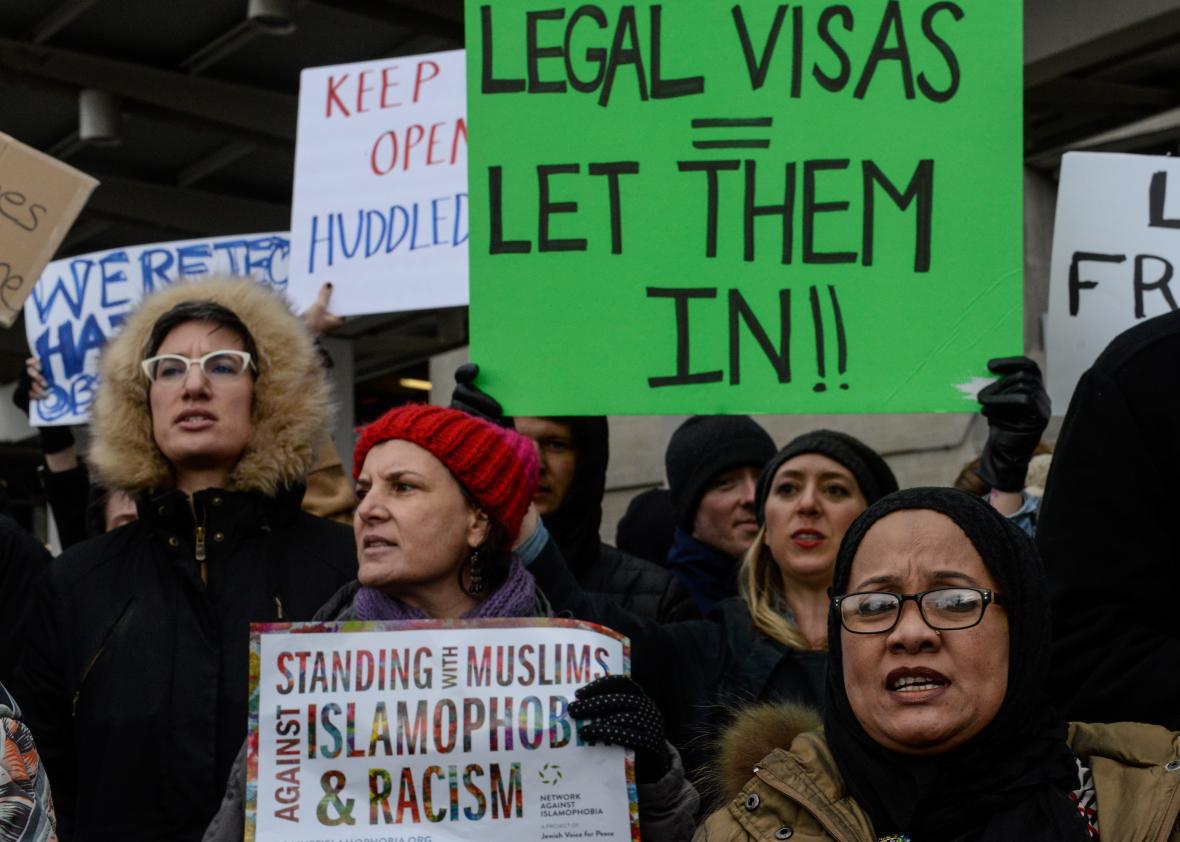The United States government is certain that Haider Sameer Abdulkhaleq Alshawi does not pose a security threat to the country. That’s why it granted Alshawi, an Iraqi, a visa to come to America and join his wife and children, who had already fled and resettled in Texas. (In Iraq, Alshawi’s family members were victims of an attempted kidnapping and a car bombing because Alshawi’s wife worked for a U.S. contractor.) On Friday, Alshawi boarded a flight to New York’s JFK International Airport. While he was in the air, Donald Trump signed an executive order prohibiting Iraqi refugees from entering the country. When Alshawi’s plane landed, reports the New York Times, agents from Customs and Border Protection boarded it and took him into custody. They prohibited Alshawi from contacting his attorneys, who were waiting for him at the airport. The attorneys asked a CBP agent who they should speak to in order to help their client.
“Mr. President,” a CBP agent responded. “Call Mr. Trump.”
As of Saturday afternoon, Alshawi is still being detained at JFK. He is one of multiple refugees—the government won’t say how many there are—with valid documents who is nevertheless being held at an airport. (Update, Jan. 29, 2017: Alshawi was released Saturday night.) Trump’s expansive executive order prevents refugees, migrants, and even green-card holders from seven Muslim-majority countries from entering the U.S. (Reuters reports that green-card holders may be evaluated on a case-by-case basis.) The government’s interpretation of the order has led to the immediate and indefinite detention of people who, until Friday, had every right to come into the country.
There are serious constitutional problems with Trump’s executive order as a whole, including its preference for one particular religion (Christianity) and its denigration of another (Islam). The courts will debate these questions over the coming months. But for Alshawi and others like him, there is a more immediate concern: a complete and total lack of due process. As a chilling American Civil Liberties Union lawsuit filed Saturday demonstrates, Trump’s executive order has led to the flagrantly unconstitutional detention of perfectly legal immigrants whose lone crime is their national origin and religion. It is not just morally wrong. It is illegal.
The Fifth Amendment to the Constitution provides basic procedural guarantees to individuals detained in the U.S., prohibiting the government from depriving individuals of liberty without “due process of law.” Alshawi arrived in the country lawfully carrying the requisite documentation. Pursuant to the Immigration and Nationality Act, he now has a right to apply for asylum and have his claims processed by federal authorities. But the government did not do that. Instead, it instantly placed him in detention, without a hearing or any kind of judicial oversight, and barred him from speaking with his attorneys.
That is an unconstitutional deprivation of Alshawi’s liberty without due process of law. The federal government cannot indefinitely detain a lawful visitor without a hearing or any semblance of reasonable suspicion because the president signed an executive order. Nor, under the equal protection component of the amendment’s Due Process Clause, may the government discriminate against Alshawi because of his national origin or religion. Yet federal officers are currently ignoring these fundamental constitutional principles. And the entire illegal system is the handiwork of one man—Trump—acting far beyond the bounds of his executive authority. His is a government of men, not of laws, and it apparently has no compunction about locking up perceived enemies based solely on their identity. The very concept of due process emerged from a desire to limit the king’s ability to order unlawful arrests. It appears we are returning to the days when the head of state can detain purported threats without a whiff of evidence that they have broken a law.
One of the ACLU’s other clients, Hameed Khalid Darweesh, was freed on Saturday after Democratic representatives lobbied for his release. (Darweesh risked his life in Iraq working as an interpreter for the U.S. Army.) Alshawi is still being held, and the ACLU has requested a habeas corpus for him and “those similarly situated.” This extraordinary and uncommon relief would require the government to bring those detained before a judge and explain why they should continue to be held. When attorneys must resort to a habeas corpus petition to obtain basic due process rights for clients who have done nothing wrong other than being Iraqi Muslims, the federal government has entered dangerous territory. What is happening today is a constitutional crisis. And it may only be the start of Trump’s assault on the rights of minorities in America.
